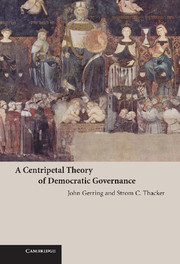Book contents
- Frontmatter
- Contents
- List of Figures
- List of Tables
- Acknowledgments
- A Centripetal Theory of Democratic Governance
- 1 Models of Governance
- PART ONE CAUSAL MECHANISMS
- PART TWO EMPIRICS
- 5 Hypotheses
- 6 Cross-National Tests
- 7 Assessing the Evidence
- PART THREE CONCLUSIONS
- Appendix A Defining Good Governance
- Appendix B Alternative Theories Revisited
- Sources
- Author Index
- Subject Index
6 - Cross-National Tests
Published online by Cambridge University Press: 06 July 2010
- Frontmatter
- Contents
- List of Figures
- List of Tables
- Acknowledgments
- A Centripetal Theory of Democratic Governance
- 1 Models of Governance
- PART ONE CAUSAL MECHANISMS
- PART TWO EMPIRICS
- 5 Hypotheses
- 6 Cross-National Tests
- 7 Assessing the Evidence
- PART THREE CONCLUSIONS
- Appendix A Defining Good Governance
- Appendix B Alternative Theories Revisited
- Sources
- Author Index
- Subject Index
Summary
Having introduced our theoretical hypotheses and independent variables, we turn now to questions of research design. We begin with a brief discussion of how one might go about measuring that ineffable state of grace known as “good governance” and proceed to a discussion of methods and a description of variables used in the analysis. The chapter concludes with a presentation of the empirical results.
MEASURING GOOD GOVERNANCE
In order to provide an empirical test of the causal effects of centripetal institutions on good governance we must arrive at a set of indicators that accurately measures the quality of governance in a country. Some might argue that this is an impossible quest. Perhaps these matters simply cannot be measured. Doubts notwithstanding, most observers are fairly comfortable making qualitative judgments about extreme cases of misgovernance such as is found today in the Democratic Republic of Congo (formerly Zaire) or in Somalia (the classic “failed state”). We have no trouble at all concluding that the quality of governance is worse in these countries than it is, say, in northern Europe. The fact that we can make such judgments at all is testament to the existence of a set of norms that we apply to governments – all governments. What are these norms? What are the components of good/bad governance? What is it that we expect governments to do, and how might these outcomes be measured, and hence more systematically compared?
A good outcome measure of governance, for present purposes, must balance four criteria.
- Type
- Chapter
- Information
- A Centripetal Theory of Democratic Governance , pp. 101 - 142Publisher: Cambridge University PressPrint publication year: 2008



